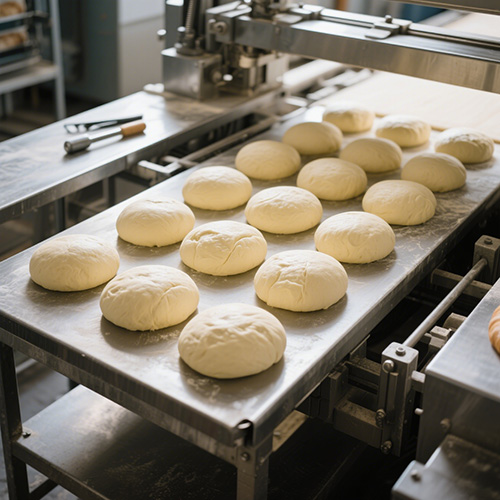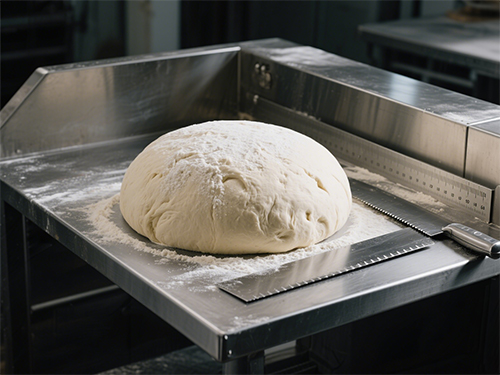



In today’s fast-paced baking industry, the demand for high-quality, consistent products has driven a major shift toward automation. For high-volume bakers, commercial dough mixers have become indispensable tools on the production line, playing a crucial role in boosting efficiency, ensuring product quality, and reducing operational costs. In this blog post, we’ll explore why commercial dough mixers are essential tools for bakeries looking to scale up their operations.
Commercial baking equipment, including dough mixers, is specifically designed for high-capacity production environments. These machines are durable, efficient, and tailored to meet the demands of large-scale bakeries. In any modern bread production line, the dough mixer is considered the “heart” of the operation. It combines ingredients such as flour, water, yeast, and other components into uniform dough in a fraction of the time compared to manual mixing.
Key features of commercial dough mixers include:
One of the primary advantages of commercial dough mixers is their ability to significantly increase production efficiency while reducing reliance on manual labor. With the rise of automated baking equipment like tunnel ovens, spiral coolers, and proofing chambers, bakeries can implement continuous production lines, increasing output and improving workflow.
By integrating automated machinery, bakeries are able to:
Consistency is key when it comes to baking, and commercial dough mixers ensure that every batch meets the same high standards. The precise mixing of ingredients like flour, sugar, fat, and additives is the first step in ensuring the quality of baked goods.
Some of the advanced features in modern dough mixers include:
By offering these features, commercial dough mixers enable bakeries to produce products that are uniform in texture, flavor, and appearance—key factors in maintaining customer satisfaction.
The baking industry is rapidly evolving, with increasing demand for automation, sustainability, and innovation. Commercial dough mixers have kept up with these trends by offering versatility and flexibility. With the ability to switch between different types of dough and adjust production lines quickly, these mixers allow bakeries to stay competitive and adapt to changing market demands.
As consumer preferences evolve and new baking trends emerge, bakeries can:
The ongoing innovation in dough mixing technology also aligns with the industry’s push towards sustainability, offering energy-efficient solutions that reduce waste and optimize resource use.
In summary, commercial dough mixers are essential for high-volume bakeries that aim to boost production efficiency, maintain product consistency, and stay ahead of the competition. These machines allow bakeries to scale up operations, reduce labor costs, and meet the growing demand for high-quality baked goods. Their capacity, efficiency, and precision make them a cornerstone of modern, automated baking lines.
Here is an overview of the key features that make commercial dough mixers essential for any bakery:
| Feature | Description |
|---|---|
| High Capacity | Designed to handle large quantities of dough, ideal for bulk production. |
| Durability | Built to withstand high-intensity, continuous use in a busy bakery environment. |
| Programmable Settings | Offers adjustable mixing speeds and times for different dough types, ensuring optimal results. |
| Temperature Control | Maintains ideal dough temperatures, preventing premature fermentation and ensuring product consistency. |
| Custom Attachments | Includes specialized tools for different dough types, enhancing mixing efficiency. |
For bakeries seeking higher output, more consistent quality, and lower operating costs, investing in a commercial dough mixer is a crucial step toward achieving these goals. Its advanced features and flexible adaptability ensure bakeries remain competitive in an ever-evolving industry.
If you’re ready to optimize your bakery’s production, enhance consistency, and reduce labor costs, contact us today to find the commercial dough mixer best suited to your needs. Let us help elevate your baking business to new heights!
Consult our team today or explore our full range of high-quality, innovative baking equipment tailored to your specific requirements. Whether expanding an existing operation or launching a new bakery, we are dedicated to supporting your success!
Why do I need a commercial dough mixer for my bakery?
Commercial dough mixers increase efficiency, improve product consistency, and reduce labor costs, making them essential for high-volume bakeries.
How does a commercial dough mixer ensure product consistency?
These mixers feature programmable settings for speed, time, and temperature, ensuring uniform dough texture and quality across all batches.
Can a commercial dough mixer handle different types of dough?
Yes, most commercial dough mixers come with customizable settings and attachments designed for various dough types, including bread, pastry, and pizza dough.
How does a commercial dough mixer reduce labor costs?
By automating the mixing process, these machines reduce the need for manual labor, allowing bakeries to maintain high output with fewer staff.
What’s the difference between a commercial dough mixer and a regular mixer?
Commercial dough mixers are specifically designed for high-capacity, continuous use, offering higher durability, larger mixing capacities, and more advanced features compared to regular mixers.

